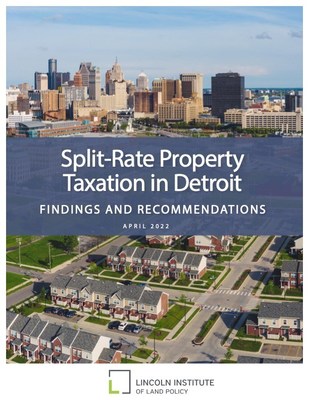[ad_1]
CAMBRIDGE, Mass., April 4, 2022 /PRNewswire/ — Reforming Detroit’s home tax method by taxing land at a increased rate than structures would enable to revive the community economic system and decrease tax bills for practically just about every homeowner, according to a new review from the nonprofit Lincoln Institute of Land Coverage.

With the most affordable property values of any large U.S. town and some of the maximum property tax costs, Detroit is caught in a many years-lengthy cycle of climbing tax charges that nonetheless fall short to crank out ample revenue. In the absence of strong public companies, high assets taxes enhance proprietor expenses, cut down residence values, and raise the expenses of restore and redevelopment, making a drag on financial recovery.
Like a lot of economically distressed cities, the metropolis copes with this problem by providing generous tax abatements for new growth and for some property owners. Abatements reduce excessive expenditures and quickly increase residence values, but they can only be given to a compact established of residents and new organizations. This leaves high—sometimes destabilizing—tax expenses in place for prolonged-phrase house owners. Although large taxes remain on most residences and organizations, inclusive and long lasting incentives for reinvestment are absent.
A better tax charge for land than for structures—known as “break up-level” mainly because there are two diverse tax rates—would deal with the trouble extra correctly and distribute the rewards far more equitably.
The new examine, Split-Rate Property Taxation in Detroit: Conclusions and Suggestions, finds that taxing land at five periods the amount for structures would consequence in reduce tax costs for 96 per cent of house owners, with an regular personal savings of about 18 percent. Underneath a income neutral reform, tax financial savings would be totally offset by tax boosts on vacant and underutilized residence.
“By adopting a split-charge home tax, Detroit can make its tax technique both much more successful and extra equitable,” claimed John Anderson, an economist at the University of Nebraska, Lincoln, and lead author of the analyze. “Efficiency is increased by taking away the tax-linked obstacles to funds enhancements and improvement. Fairness is enhanced by a reduction in taxes for the wide vast majority of household owners.”
“Splitting the home tax offers extensive-time Detroiters with the tax reduction that new corporations and citizens previously obtain,” said co-author Nick Allen, former manager of system and plan for the Detroit Economic Growth Company and now a doctoral candidate at the Massachusetts Institute of Technologies. “Our review shows that it is an helpful, speedy way to completely minimize burdens on overtaxed homes and restore residence prosperity. It really is not enough, but it is a necessary step towards racially equitable recovery.”
In addition, a break up-fee tax raises the value of keeping vacant land and decreases the charge of establishing it, or of renovating deteriorated properties. Reduced tax burdens and accelerated financial investment guide to an common raise of 12 p.c in the benefit of residential house and an enhance of 20 p.c for commercial house. In a supporting technological paper, the undertaking group also discovered that the proposed 18 % reduction in residential taxes would reduce household tax foreclosures by at the very least 9 %.
“Implementation of a split-fee tax in Detroit provides an option to improve the property tax system by expanding performance, and minimizing residence tax inequities and tax foreclosures,” reported Michigan State University economist Mark Skidmore, a co-writer of the research.
Commissioned by Spend Detroit with assist from The Kresge Foundation, the analyze analyzes information from municipalities in Pennsylvania that have executed spit-amount taxes, as perfectly as real estate and property tax data from Detroit. In addition to Anderson, Allen, and Skidmore, the study’s co-authors include things like Fernanda Alfaro of Michigan Condition University, Andrew Hanson of the College of Illinois at Chicago, Zackary Hawley of Texas Christian College, Dusan Paredes of Northern Catholic University in Chile, and Zhou Yang of Robert Morris University.
“If we are to continue on the momentum of Detroit’s beneficial, equitable expansion, we must renovate our property tax construction to ease the burden on the vast majority Black home owners and community developers,” mentioned Dave Blaszkiewicz, president and CEO of Make investments Detroit. “This report delivers a answer that accomplishes that although also disincentivizing blighted and underutilized houses that hinder Detroit’s growth.”
“With this analysis, Spend Detroit has elevated an equitable tactic to taxation that can bring significantly-necessary aid to tax-burdened Detroiters while encouraging expense and advancement. This is a timely notion that addresses an urgent issue, and the highly regarded Lincoln Institute of Land Coverage has now delivered a reliable framework for community conversations,” reported Wendy Lewis Jackson, taking care of director of Kresge’s Detroit Program.
The team also manufactured 3 complex papers to guidance the research: “Evaluation of Home Tax Reductions on Tax Delinquency, Tax Foreclosures, and Household Ownership,” “Split-Charge Taxation and Enterprise Establishment Site Evidence from the Pennsylvania Experience,” and “Break up-Fee Taxation: Impacts on Tax Foundation,” all published by the Lincoln Institute.
The analyze is out there for obtain on the Lincoln Institute’s web-site: https://www.lincolninst.edu/publications/other/split-price-house-taxation-in-detroit
The Lincoln Institute of Land Plan seeks to boost top quality of lifestyle via the effective use, taxation, and stewardship of land. A nonprofit non-public running foundation whose origins date to 1946, the Lincoln Institute researches and endorses innovative techniques to land as a remedy to economic, social, and environmental problems. By way of training, education, publications, and activities, we combine concept and practice to advise public plan choices around the world.
![]() Check out unique content to obtain multimedia:https://www.prnewswire.com/information-releases/new-report-taxing-land-extra-than-properties-would-assistance-detroit-house owners-and-spur-improvement-301516877.html
Check out unique content to obtain multimedia:https://www.prnewswire.com/information-releases/new-report-taxing-land-extra-than-properties-would-assistance-detroit-house owners-and-spur-improvement-301516877.html
Source Lincoln Institute of Land Policy

[ad_2]
Source backlink
